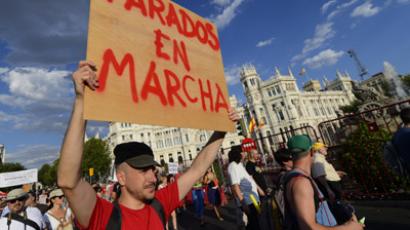Brussels approves Madrid’s bailout request
Eurozone finance ministers have approved Spain's formal aid request for some 39.5 billion euro of bailout funds to keep the country's banking system afloat.
On Monday Madrid officially asked Brussels for 37 billion euro to recapitalize its four biggest lenders and another 2.5 billion for the "bad bank" that is anticipated to be paid out on December 12, the Economy Ministry said in a statement.The money will be divided with 18 billion euro going to Bankia, 9 billion to Catalunya Banc, 5 billion to Nova Caixa Galicia and 4.5 billion to Banco de Valencia.The new loans will have a ten-year grace period with 12 and a half-year maturity and an interest rate of less than one percent in the first year. “We believe these are advantageous conditions that will help heal, restructure and overcome the problems in the Spanish banking system. It’s positive, it’s fundamental, it’s vital and we won’t make the mistakes of the past,” Spain’s finance minister Luis de Guindos was quoted by Financial Times as saying.The trench approved by Brussels is the first installment of a 100 billion euro package agreed to in July. The news of the bailout had a positive reaction as the euro hit a new six-week high against the dollar.“Spain needs less than initially thought,” Austrian Finance Minister Maria Fekter noted. “It is a very strong signal that we have been able to stabilize the eurozone as a whole,” Deutsche Presse-Agentur reported.In exchange for financial aid, the banks are expected to adhere to a strict austerity program, which is likely to include employee cutbacks, which could spark even more protests in a country with a 25.6 percent unemployment rate. Some policymakers believe that the government’s interference in the financial sector will just make things worse.“The government has intervened too much in the market and the way to solve the problem is by the government withdrawing, by getting government to spend less and tax less and regulate less. That is what will take the economy back in order, what will cause the job rate to grow again,” Toine Manders, the chairman of the Libertarian Party of the Netherlands has told RT.Spain's banking sector has been dealt a tremendous blow after suffering heavy home loan its property bubble burst in 2008, leading the country's government to adopt harsh austerity measures that had led to constant public protests. The latest rallies were held on Saturday when angry Spaniards took to the streets claiming that banks stole their savings and demanding that the lenders return their assets. “Thieves! Where is our money?” slogans were heard outside the central bank in Madrid as over 1,000 protesters demanded justice before marching on the offices of Bankia, one of the recipient of the first aid trenche.“There is a fundamental flaw within the banking system, which is that the government has basically taken over the banks, they've created a banking cartel, they created the central bank. They've allowed the banks to print money that is not covered by anything,” Manders says














